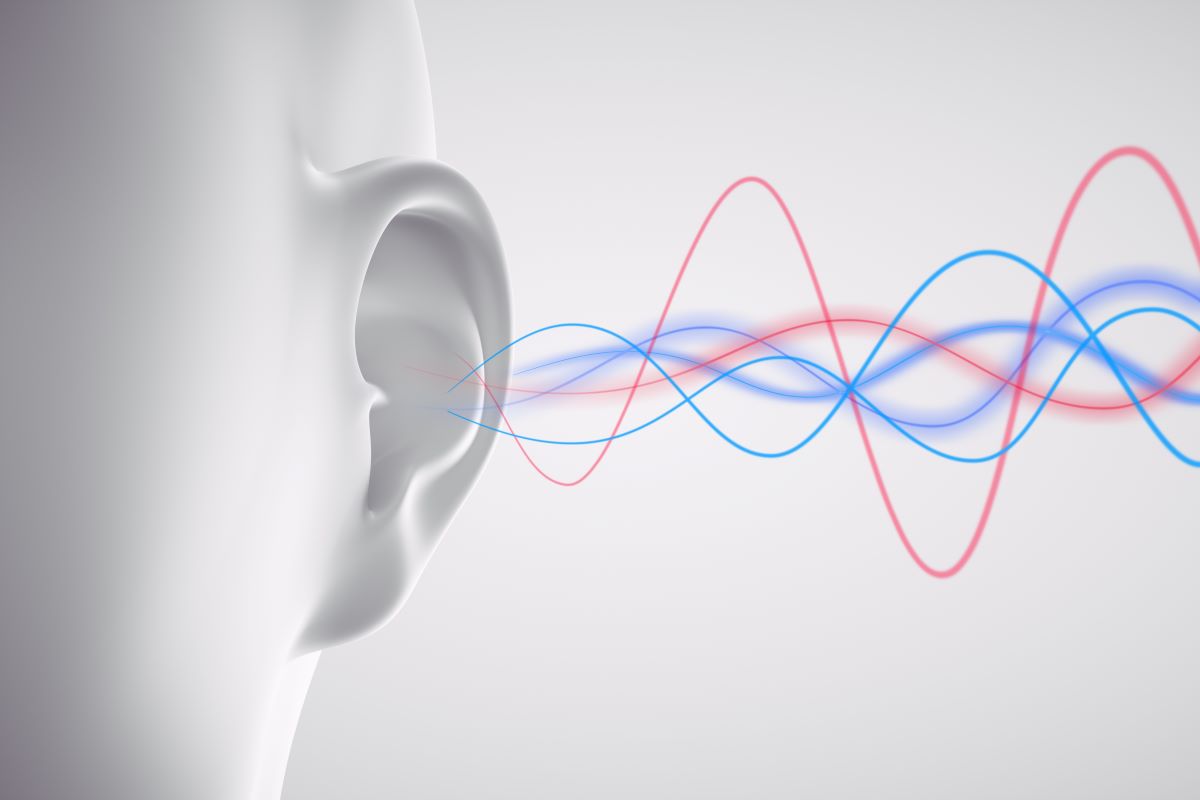What is tinnitus?
Tinnitus is defined as the perception of sound without an external source. This means that you can hear sounds inside your head that are created by your internal hearing system, but nobody else around you can hear them.
It can manifest itself as a ringing, buzzing, hissing or something similar and may either occur in occasional bouts or have a constant, persistent presence.
Tinnitus is a condition which affects around 13% of adults in the UK (7.1 million people) yet it’s often a highly misunderstood condition that can significantly impact an individual’s quality of life.
In support of Tinnitus Awareness Week 2024 (5th-10th February), we wanted to share some helpful information regarding tinnitus, exploring its causes, symptoms, and treatment options in the hopes that it can help others understand and manage the condition.

Understanding tinnitus
Tinnitus isn’t a condition in and of itself, but rather a symptom of an underlying condition affecting the auditory system. The auditory system is a complex network responsible for processing sound signals, comprising the outer ear, middle ear, inner ear, auditory nerve, and the auditory centres in the brain.
Our perception of sound relies on how well our auditory system is functioning. Any disruption or damage to these components can lead to the perception of sound that isn’t externally present i.e. tinnitus.
Whilst many of us may be familiar with ringing in our ears for a short period following exposure to loud noise i.e. after attending a concert (acute tinnitus), for others this is their daily reality (chronic tinnitus).
Mechanisms of tinnitus
Understanding the mechanisms behind tinnitus involves considering the intricate processes that occur within the auditory system, and how they can cause the symptoms to manifest.
- Inner ear: The inner ear contains hair cells responsible for converting sound vibrations into electrical signals sent to the brain. If these hair cells are damaged through repeated exposure to loud noise or during the ageing process, this can contribute to the development of tinnitus.
- Neurological changes: Tinnitus isn’t just a result of physical damage, it also involves changes in the way the brain interprets sound signals. When the hair cells are damaged, the auditory nerves send signals to the brain. In response, the brain may change how it perceives these signals and amplify certain signals which can create the perception of sound, even when there is none.
- Central auditory processing issues: Problems in the central auditory processing system can interfere with the brain’s ability to interpret and make sense of auditory signals received from the ears. The brain may begin to process sound signals differently than it would in a non-tinnitus scenario, giving more attention to the sounds associated with tinnitus and therefore making them more prevalent.

Types of tinnitus
Tinnitus can be broadly classified into two main categories: subjective and pulsatile.
Subjective tinnitus
This is the most common type of tinnitus, accounting for the majority of cases. It’s a perception of sound that only the individual experiencing it can hear, and the nature of the sound can vary from ringing and buzzing to more complex sounds like music or noises.
Pulsatile tinnitus
This is less common and usually presents itself as a rhythmical noise, often following the same rate that the heart beats. Unlike subjective tinnitus, this may also be heard by others such as a medical professional if they were to examine the individual.
Where subjective tinnitus can be caused by various factors which we’ll discuss below, pulsatile tinnitus is typically caused by changes in blood flow vessels near the ear or by a change in awareness of the blood flow.
Anyone experiencing pulsatile tinnitus should seek advice from an ENT specialist. Harley Street Hearing can refer you to a specialist in this field, get in touch with us to find out more.
Risk factors for tinnitus
There is no single cause of tinnitus, and anyone is at risk of developing it regardless of age or gender. In the same way that symptoms and severity vary from person to person, so do the causes.
However, it can typically be attributed as a symptom of other underlying medical conditions or a problem within the audiological system.
Common risk factors for tinnitus include:
- Hearing loss – Tinnitus is more common in people with hearing loss, and many people who suffer from tinnitus also experience hearing loss. Due to the damage to the auditory system present in those with a hearing impairment, the brain has to adapt to how it processes sounds and often ‘fills in the gaps’ with tinnitus.
- Loud noise exposure – Similarly, those working in noisy environments such as construction sites or music venues without wearing hearing protection are at a higher risk of developing tinnitus due to prolonged exposure to loud sounds which can damage the ear over time.
- Ear wax blockage – An accumulation of ear wax can impede the conduction of sound waves leading to irritation and potential tinnitus symptoms. This can often be resolved with ear wax removal.
- Ménière’s disease – This is an inner ear disorder which, if pre-existing, can cause excessive fluid build-up that may lead to tinnitus and hearing loss.
- Certain medications – Oxotoxic drugs, such as some antibiotics, chemotherapy drugs, and high doses of aspirin can harm the auditory system and contribute to tinnitus.

The impact of tinnitus on quality of life
Chronic tinnitus can have a profound effect on an individual’s quality of life. We see it firsthand with our tinnitus patients here at Harley Street Hearing, and whilst symptoms can vary from person to person it’s clear that its impacts extend far beyond the auditory system.
Tinnitus can influence various aspects of an individual’s life, such as:
Interference with sleep cycles
The constant or intermittent nature of tinnitus can be incredibly disruptive to sleeping patterns, making it difficult to get a good night’s rest. A person may have difficulty falling or staying asleep, which can in turn lead to fatigue and increased stress levels.
Cognitive performance
Persistent tinnitus can be a huge distraction and make it challenging to concentrate on tasks, therefore affecting work performance and overall productivity.
Emotional well-being
Tinnitus can have a huge emotional toll on an individual due to the daily battle against their symptoms. This can lead to feelings of heightened anxiety and in some cases, depression.
Ability to socialise
Those with severe tinnitus may find it challenging to engage in social activities, due to their inability to participate or concentrate. This can lead to strained relationships with family and friends, and eventual social isolation.
Treating tinnitus
Whilst there is no cure for tinnitus, there are many effective methods that can help to alleviate the symptoms and make the condition more manageable.
Harley Street Hearing offers the following treatment for tinnitus:
- Tinnitus sound therapy – Using specialised techniques and sound therapy machines, this method can help to relieve tinnitus symptoms by reducing an individual’s awareness of internal sounds. This can be effective in even the most severe tinnitus cases.
- Tinearity G1 – This is a revolutionary sound generator which utilises white noise to transmit sounds directly into the inner ear via the skull instead of through the ears.
- Hearing aids – If you are found to have hearing-loss-induced tinnitus, hearing aids may be an effective treatment to provide relief. We can offer an extensive range of industry-leading devices, tailored to your individual needs.
- Hearing protection – To avoid further damage to your hearing where exposure to loud noises is unavoidable, we can provide custom-fitted hearing protection.

Before undergoing any type of tinnitus treatment, it’s important to first get an accurate diagnosis from a clinical audiologist. This will help to get an understanding of the root cause of your tinnitus, and therefore inform the most appropriate treatment method.
Harley Street Hearing are a highly skilled team of clinical audiologists in London, specialising in providing personalised tinnitus therapy and support. We understand how debilitating it can be and will devise a treatment solution tailored to your needs.
If you or someone you love is experiencing tinnitus, find your nearest clinic or get in touch with us to book a consultation.
Enjoy this article? You might be interested in some of our others:












